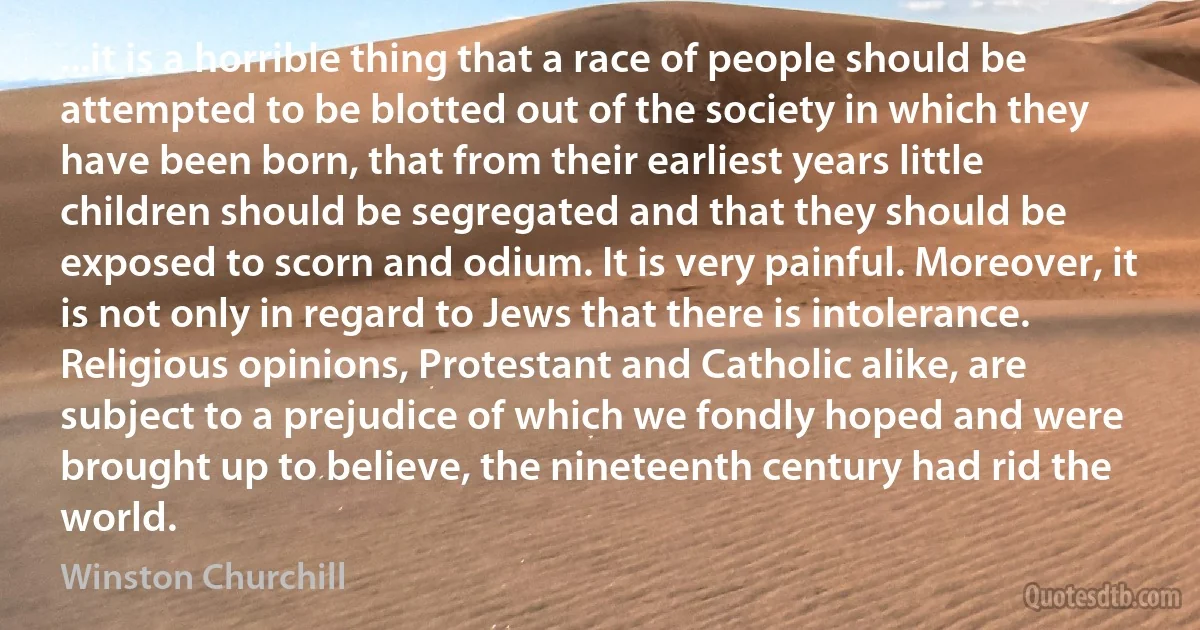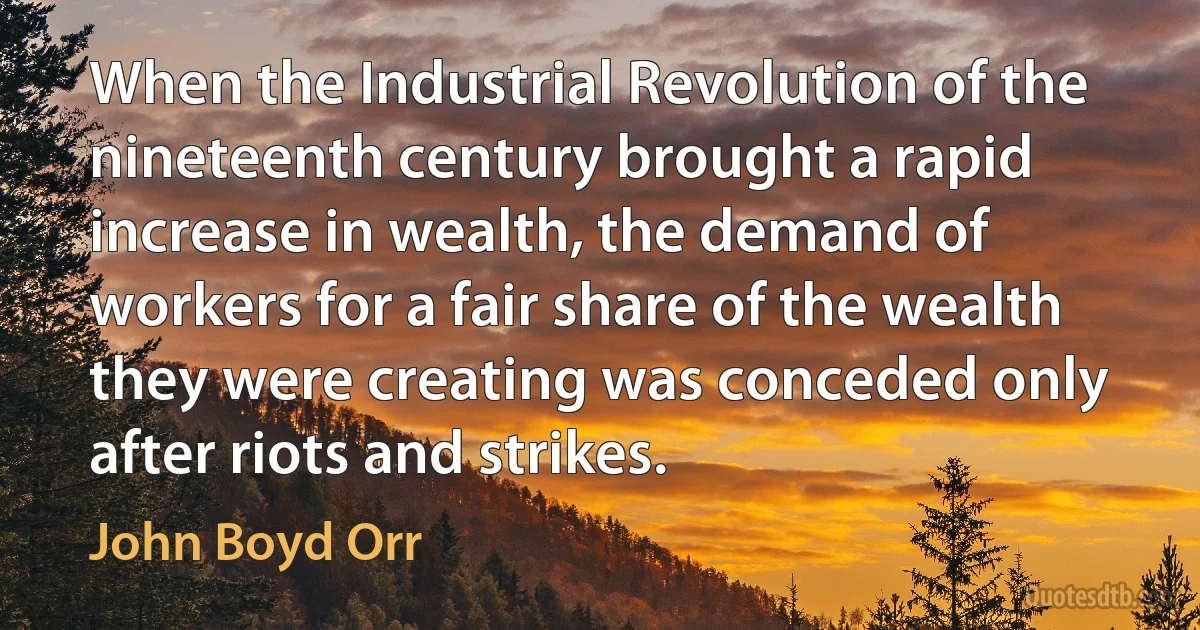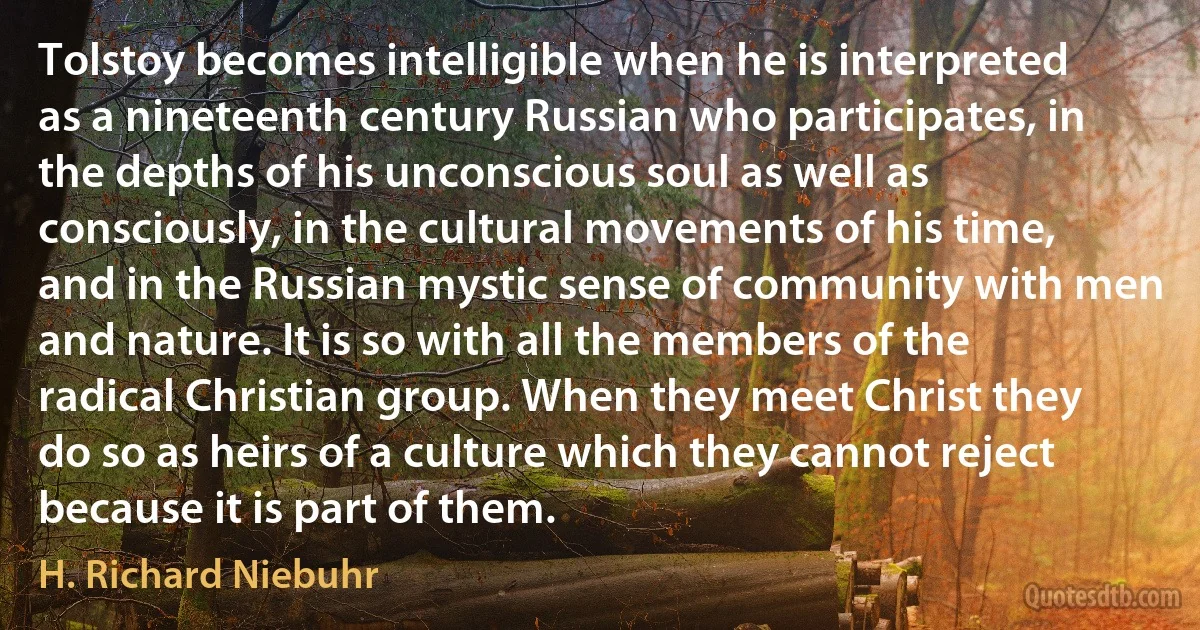Nineteenth Quotes - page 6
The real struggle today, just as in the second quarter of the nineteenth century, is between a view of the world termed liberalism or radicalism, for which the primary object of government and of foreign policy is peace, freedom of trade and intercourse, and economic wealth and that other view, militarist or rather diplomatic, which thinks in terms of power, prestige, national or personal glory, the imposition of a culture and hereditary or racial prejudice. To the good English radical, the latter is so unreal, so crazy in its combination of futility and evil, that he is often in danger of forgetting or disbelieving its actual existence.

John Maynard Keynes
Communism draws its strength from deeper, more serious sources. Offered to us as a means of improving the economic situation, it is an insult to our intelligence. But offered as a means of making the economic situation worse, that is its subtle, its almost irresistible, attraction. Communism is not a reaction against the failure of the nineteenth century to organize optimal economic output. It is a reaction against its comparative success.

John Maynard Keynes
Our time is Gothic in its spirit. Unlike the Renaissance, it is not dominated by a few outstanding personalities. The twentieth century has established the democracy of the intellect. In the republic of art and science, there are many men who take an equally important part in the intellectual movements of our age. It is the epoch rather than the individual that is important. There is no one dominant personality like Galileo or Newton. Even in the nineteenth century, there were still a few giants who outtopped all others. Today the general level is much higher than ever before in the history of the world, but there are few men whose stature immediately sets them apart from all others.

Albert Einstein
The distribution of wealth is one of today's most widely discussed and controversial issues. But what do we really know about its evolution over the long term? Do the dynamics of private capital accumulation inevitably lead to the concentration of wealth in ever fewer hands, as Karl Marx believed in the nineteenth century? Or do the balancing forces of growth, competition, and technological progress lead in later stages of development to reduced inequality and greater harmony among the classes, as Simon Kuznets thought in the twentieth century? What do we really know about how wealth and income have evolved since the eighteenth century, and what lessons can we derive from that knowledge for the century now under way?

Thomas Piketty
In the nineteenth and twentieth centuries you have these great nation states hurling their young men at one another. The victory was really going to rest on who could do the best job of bringing up their kids to become efficient and effective soldiers. That's pretty grandiose, I guess, but I do think that, and thank God it's been the armies of democracy that have emerged from this as the triumphant armies.

Stephen Ambrose
The old form of trade union, which was born in the nineteenth century and aimed primarily at negotiating wages for a specific trase is no longer sufficient. First of all, as we have been argueing, the old trade unions are not able to represent the unemployed, the poor, or even the mobile and flexible post-Fordist workers with short term contracts, all of whom participate actively in social production and increase social wealth. Second, the old unions are divided according to the various products and tasks defined in the heyday of industrial production - a miners' union, a pipefitters' union, a machinists' union and so forth. Today, insofar as the conditions and the relations of labor are becoming common, these traditional divisions (or even newly defined divisions) no longer make sense and serve only as an obstacle. Finally the old unions have become purely economic, not political, organization.

Antonio Negri
A persuasive way of understanding the collapse of Communism in Europe and the Soviet Union is to think of nineteenth- or twentieth-century slum clearance. For in many respects the Soviet Empire was a slum of continental proportions. Beyond the grotesque architectural assertions of an alien ideology, public housing – almost all housing – consisted of anomic and primitive concrete barracks where the smells of cabbage, damp and low-grade tobacco combined. Rivers and lakes were polluted by chemicals, with the Pleisse river in East Germany alternately turning first red then yellow.

Michael Burleigh
Gradually... during the second half of the nineteenth century, the uncomfortable feeling of dislike of the action at a distance, which had been so strong in Huygens and other contemporaries of Newton, but had subsided during the eighteenth century, began to emerge again, and gained strength rapidly.
This was favoured by the purely mathematical transformation (which can be compared in a sense with that from the Ptolemaic to the Copernican system), replacing Newton's finite equations by the differential equations, the potential becoming the primary concept, instead of the force, which is only the gradient of the potential. These ideas, of course, arose first in the theory of electricity and magnetism or perhaps one should say in the brain of Faraday.

Willem de Sitter
I am amazed when I see young people eating meat. It seems to me so much thing from other times! The carnivore youth is not with the times, it has a stomach of the nineteenth century, who carnivorized Europe... Eating pieces of slaughtered animals is an anomaly, out of a vegetarian diet there is no real youth. Meat is mostly an anguished habit of old people. Requiring meat dishes, talking about it, remembering it, it's a thing of old people, old and unable to rejuvenate with a decidedly alternative diet.

Guido Ceronetti
The original role of the machine started to get perverted around the time of the industrial revolution. It came to be regarded not as a means to a desired end, but as part of the end in itself. The process accelerated in the nineteenth century, and exploded in the twentieth. Man kept demanding more in the way of service from his technology, and the technology kept giving it-but always at the price of a little more of man's individual self-contained powers. In the end-in our time-our technology has become second thing to a religion. Now we're trapped in it. And we're so enfeebled by our entrapment that we tell ourselves it's the only possible way to live. That no other way exists.

Gordon R. Dickson
It must be admitted that among a certain number of advanced mathematical physicists whose work has lain mainly in the twentieth century, the ether is regarded with suspicion, or even with contempt. And some of the opponents go so far as to as to say that the nineteenth century idea of the ether has failed to establish itself, and that in consequence the whole idea of the ether is under a cloud, and that it is only upheld by a few antiquated supporters, who, though are willing to admit many modifications in the original nineteenth century notions of an ether, feel the need of a medium capable of performing the functions attributed to it.

Oliver Lodge
Throughout the nineteenth century, apart from the division in theoretical sciences and arts, classifiers attempted to divide the sciences into two groups. Already they had before them the examples of Francis Bacon (speculative and descriptive) and Hobbes (quantitative and qualitative). For Coleridge, the sciences were either pure (Grammar, Logic, Rhetoric, Mathematics, Metaphysics) or mixed. Arthur Schopenhauer's similar groups were called pure and empirical, Wilhelm Wundt in 1887 called them formal and empirical, Globot mathematical and theoretical, and the St. Louis Congress of Arts and Sciences (1904) normative and physical.

Brian Campbell Vickery
There were the Chârvâkas, who preached horrible things, the most rank, undisguised materialism, such as in the nineteenth century they dare not openly preach. These Charvakas were allowed to preach from temple to temple, and city to city, that religion was all nonsense, that it was priestcraft, that the Vedas were the words and writings of fools, rogues, and demons, and that there was neither God nor an eternal soul. If there was a soul, why did it not come back after death drawn by the love of wife and child. Their idea was that if there was a soul it must still love after death, and want good things to eat and nice dress. Yet no one hurt these Charvakas.

Charvaka
But a sculpture which sets out to achieve the same ends demands an almost unbelievable effort of concentration. Practically none of the episodes or moments of such a legend, [of Prometheus ] really lends itself to sculpture, and the sculptors of the nineteenth century were often quite careless or foolish in the choice of the moment which they set out to represent. Their works could thus become cluttered with all sorts of narrative details which detract from the monumental quality of the whole... That's why, in my 'Prometheus', I represent the fire as an integral part of the presence or appearance of the hero; he stands there before us in all his awe-inspiring grandeur, a human figure that seemed in the eyes of the men who first saw him to be actually consumed by the fire that he was bearing.

Ossip Zadkine
Both Fascist Italy and Nazi Germany did indeed allow-or, more accurately, tolerate-private property. However, it was ‘property' in a peculiar and very restricted sense-not the virtually untrammeled private ownership of Roman law and nineteenth–century Europe, but rather conditional possession, under which the state, the owner of last resort, reserved to itself the right to interfere with and even confiscate assets which in its judgment were unsatisfactorily used.

Richard Pipes
Currency competition and free banking might increase the efficiency of the financial system, and bring some small triangle welfare gains. But the key question is whether their adoption would improve macroeconomic performance. Even though Salin argues (p. 281) that ‘the best system is that which produces the least inflation', fluctuations in output are also expensive.
Hayek states that the adoption of his proposal would end recessions. There is absolutely no reason to believe that. Nineteenth century history is evidence that free banking and currency issue, in the wrong legal and regulatory framework, can produce rather than reduce instability. The proponents of free banking and currency issue in this volume do not go much beyond a general belief in competition in justifying their views; they have certainly not explored the necessary legal and regulatory environment in any detail.

Stanley Fischer
We have known since the middle of the nineteenth century that the world is not composed only of particles. ...the world is also composed of fields. ...General relativity is a theory of... the gravitational field. ...Because there are three sets of field lines, the gravitational field defines a network of relationships having to do with how the... lines link with one another. ...This is why we call relativity a relational theory.

Lee Smolin



